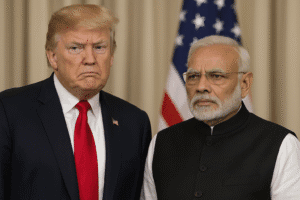India Snubbed? 5 Shocking Ways Trump’s Moves Are Sabotaging a Key Strategic Partnership
Five months into Donald Trump’s second term, India’s initial optimism about stronger U.S. ties is fading due to a series of missteps. Aggressive deportations, sudden student visa restrictions, and mixed signals on trade have strained relations, while Trump’s handling of India-Pakistan tensions—failing to unequivocally support New Delhi—has particularly frustrated Indian leaders.
Walter Russell Mead warns that these actions risk alienating a key strategic partner at a time when U.S.-India collaboration is vital to countering China. For India, the partnership isn’t just about geopolitics; it’s about economic growth and global recognition of its rising stature. Perceived slights, like equating India with Pakistan, undermine trust and fuel public backlash. If Trump continues to take India’s support for granted, he may weaken a critical alliance—one that demands respect as much as shared interests. The lesson? Strong partnerships require careful diplomacy, not needless friction.

India Snubbed? 5 Shocking Ways Trump’s Moves Are Sabotaging a Key Strategic Partnership
Five months into Donald Trump’s second term, the initial optimism in India about strengthened U.S. ties is fading. Walter Russell Mead, a prominent U.S. foreign policy expert, warns in The Wall Street Journal that the Trump administration’s recent actions risk alienating a critical ally—one that had openly welcomed his return to power.
From Warm Welcome to Growing Discontent
India was among the few major nations to celebrate Trump’s re-election, drawn to his pragmatic stance on global issues—from his handling of Russia to his public embrace of India as a rising power. Many in New Delhi hoped for a strategic partnership that balanced trade disputes with shared geopolitical goals, particularly countering China.
But recent moves by the Trump administration have left India questioning its early enthusiasm:
- Aggressive Deportations: While deportations of Indian nationals occurred during Trump’s first term, the use of military aircraft and shackles for detainees sparked outrage in India, turning a policy issue into a political flashpoint.
- Student Visa Chaos: The abrupt suspension of new student visa interviews in May 2025 blindsided India, even as Indian students increasingly fill the gap left by declining Chinese enrollments in U.S. universities.
- Economic Mixed Signals: Trump’s public criticism of Apple’s plans to shift iPhone production from China to India sent a conflicting message—just as New Delhi seeks to position itself as a global manufacturing alternative.
The Pakistan Factor: A Raw Nerve
The deepest rift, however, stems from Washington’s response to recent India-Pakistan tensions. After a terrorist attack escalated hostilities, India expected unequivocal U.S. support against Pakistan, a longtime sponsor of jihadist groups. Instead, Trump’s call for “both sides to calm down” and his subsequent boast on Truth Social about “mediating” the crisis left New Delhi embarrassed and frustrated.
As Mead notes, “Pakistan is a second- or even third-tier power marked by serial failures. India is on a different trajectory, and its public demands recognition of that success.” The perception of equating India with Pakistan—despite their stark differences—strikes at India’s core demand for respect on the global stage.
Why This Matters
The U.S.-India relationship isn’t just about countering China; for India, it’s also about economic growth and dignity. Even minor slights—like visa policies or deportation optics—can trigger outsized reactions if they’re seen as undermining India’s rise.
Mead’s warning to Trump is clear: Alienating a partner that welcomed your presidency is self-defeating. Needling India won’t make America great—it will only push New Delhi toward other alliances.
The Path Forward
For the U.S., the stakes are high. India remains a pivotal counterweight to China, a growing economic force, and a democracy that shares long-term interests with Washington. But as Mead argues, the Trump administration must navigate disagreements with more finesse—recognizing that India’s cooperation hinges as much on respect as on strategy.
You must be logged in to post a comment.